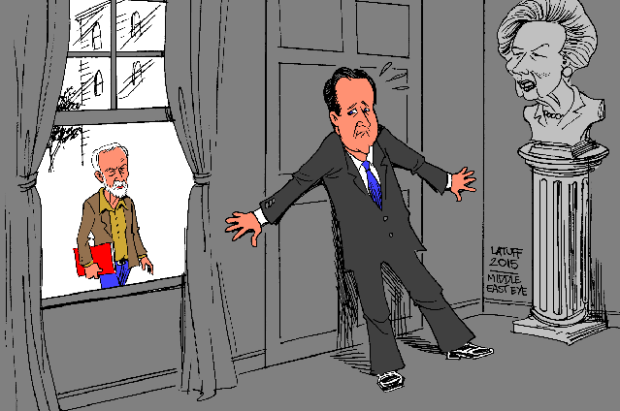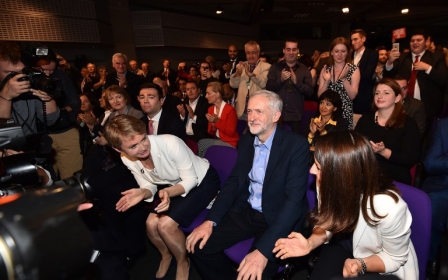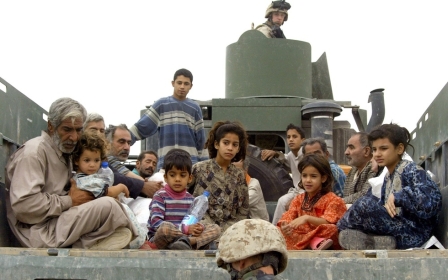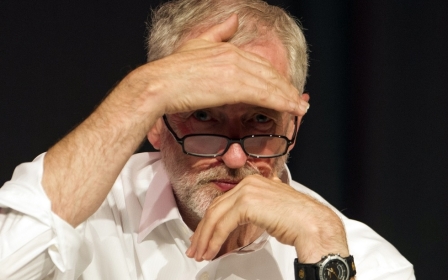Q&A: What Corbyn's win could mean for the UK's Middle East policy

With nearly 60 percent of the vote, Jeremy Corbyn won the Labour leadership election on Saturday.
MEE spoke with Chris Doyle, director of the Council for Arab-British Understanding (CAABU), to find out what Corbyn's leadership could mean for the UK's foreign policy in the Middle East.
MEE: What do you make of the Corbyn win?
Chris Doyle: It’s an extraordinary sea change in British politics as everyone accepts. Nobody imagined that Jeremy Corbyn would make it to be leader of the Labour Party. The question now is how far can he go? Is he a credible candidate to be the prime minister in 2020?
The immediate question really is does the Labour Party rally around to back him and that will be really focused in parliament where he doesn’t enjoy a huge amount of support. He wasn’t able to get the numbers of members of parliament to back him for the leadership. And there will be many people - Yvette Cooper has already said she would not serve in his cabinet - who won’t serve in his cabinet. What are they going to do when it comes down to issues where they fundamentally disagree with Jeremy? Are they going to vote against him - most noticeably on bombing Syria, for example, or are they going to be loyal?
Now, he is someone who was almost permanently voting against the party whip. So it is going to be tough for him to demand loyalty from them. How he forms his shadow cabinet, how he takes forth his programme, how he defines the very specific platform that he stands on will demonstrate whether he is going to be a leader who is prepared to sacrifice some of the principles upon which he has stood for the last 30 or 40 years for the more pragmatic need to keep some degree of party unity.
It will be a very new experience for him because he has been a backbencher without any real expectation of being in a decision making position like this. It’s easy as a backbencher on the fringes of the party to maintain these positions of principle, but when you have to coalesce around a shared platform, it’s going to be tougher. And those who wish to oppose him and don’t agree with his agenda will have the tough decisions that if they are seen to undermine him, that they will be blamed and they will contribute to Labour looking unelectable.
MEE: How may Corbyn shape UK foreign policy in the Middle East?
Doyle: There will be, for the first time in a long time, very, very clear blue water between the Conservative government’s position and that of the main opposition. And there is a likelihood that the Labour Party led by Corbyn will take positions not too dissimilar from the Scottish National Party. So this is significant.
In the past, we’ve always seen those responsible for foreign affairs in two main parties trying to work together largely to bring about common positions and not to make issues about the Middle East a partisan issue. Even on Iraq in 2003, Tony Blair had the complete backing of the Conservative Party. On many issues now with the Middle East, there will be real distinction. On Palestine, for certain, David Cameron and Corbyn are not going to agree a great deal on that.
But also, he is not in favour of intervention. He has been a core part of the Stop the War Coalition and it’s very difficult to see an instance where Jeremy Corbyn would endorse Britain going to war. This will throw up all sorts of debates. It could actually accelerate a debate, which I think is very needed, about under which circumstances it is right to engage in military action.
The next area that will be very interesting to see – that he will shine a light on as he has always done, but he will now do it from the position of being the leader of the opposition – are arms sales to regimes with appalling human rights records. That can actually put the government in a very difficult position because Britain’s arms sales are a huge part of the economy. But some of the human rights records of countries are far from perfect to put it mildly.
So we will see then a large debate between issues of pragmatic realpolitik in foreign affairs versus principle. But Corbyn will have to be mindful that there are many in the Labour Party that do not necessarily agree with this, that there are many people’s jobs, for example, that are dependent on the arms industry and this may also create some internal opposition within Labour ranks.
The other fascinating area will be on Europe where Jeremy has not been an enthusiastic supporter of the European Union. And in a strange way, you will find actually here a certain degree of common ground with some members of the Eurosceptic wing of the Conservative Party. His anti-NATO stance and his stance against nuclear weapons will also bring him in very sharp opposition to the government but also many within his own party.
So I think it really is going to open up foreign affairs, as well as many other issues, to be a far more combative part of the British political scene and it will be fascinating to see who he elects as his shadow foreign secretary, shadow international development and shadow defence ministers. I think it may tell us a great deal about how far he is personally willing to push his own views or whether he willing to go with the consensus. Is he going to appoint a shadow defence secretary who shares his view about NATO and the arm sales and military intervention? Or is he going to be more of a consensus leader?
MEE: Corbyn has said he will apologise for the British and Iraqi publics for the 2003 war in Iraq. Will he actually do that and, if so, will it have an effect of any kind?
Doyle: I see no reason why he would not do this. I think that Jeremy obviously always opposed the war, sees it as a one of the most disastrous episodes in recent British history and I think that has probably come to be accepted by a large segment of the British public but also the policy-making establishment – that Iraq was a disaster. Whether the leader of the Labour Party apologising really amounts to much is another matter.
It is not really going to resolve anything within Iraq. It’s not going to be a huge healing process. Will it heal any wounds within the Labour Party? That too, I rather doubt. It could even open up some tensions between those who supported the war and those who were against it.
MEE: What about his call for Hamas and Hezbollah to be included in talks and negotiations? Can he bring them to the table?
Doyle: As leader of the opposition, I don’t think he can exert much influence over the parties on the ground. Of course, he could make a signal by actually meeting with members of Hamas and Hezbollah as the leader of the Labour Party. Just how that might come about is another matter.
But what no doubt will happen is that there will be a debate – hopefully it will be a mature debate, not a point scoring one – on whether we should engage with parties and groups with whom we disagree including Hamas and Hezbollah and others to try to find solutions to conflicts that blight the Middle East. There are many people and not just in the hard left of the Labour party that have believed for a long time that you have to find a ways of including Hamas and Hezbollah with a political solution.
MEE: Corbyn has said the UK should stop looking at the US when formulating foreign policy.
Doyle: Jeremy represents a wing of the Labour Party that has typically been very anti policies from Washington, particularly on the Middle East, but not only on the Middle East. We will therefore see the Conservative Party feeling at ease in Washington and a Jeremy Corbyn Labour party feeling very much hostile. It will be very interesting to see how American politicians receive him, if at all and the way in which he deals with the US. Is he going to make a visit to Washington? And if he remains fairly hostile towards Europe and to the US as well, does he have a natural domain that he is going to head? Is it the global south? Are their partners that he will be trying to work towards building relationships with?
MEE: Will Corbyn’s leadership have any effect on the UK’s stance towards Syrian refugees?
Doyle: Given that the Labour Party had already committed itself to taking in more Syrian refugees, I suppose one has to wonder to what extent policy will be changed? Clearly, there will be a difference between the Conservative government and any Labour government in terms of their policies on refugees, asylum and immigration.
The issues though may come to the fore in terms of Corbyn’s policy towards Syria because there will be a feisty debate over what to do over Syria and some even on the left who will want to see him more critical of the behaviour of the Assad regime - and whether particularly those in the human rights camp will be satisfied with his policy, given the barrel bombing that has taken place by the regime, that is still a huge driver of the refugee issue. Does he have a solution to that? He’s talked about a political solution to that, but does he actually have some fresh thinking as to how that might be brought about?
Middle East Eye propose une couverture et une analyse indépendantes et incomparables du Moyen-Orient, de l’Afrique du Nord et d’autres régions du monde. Pour en savoir plus sur la reprise de ce contenu et les frais qui s’appliquent, veuillez remplir ce formulaire [en anglais]. Pour en savoir plus sur MEE, cliquez ici [en anglais].





